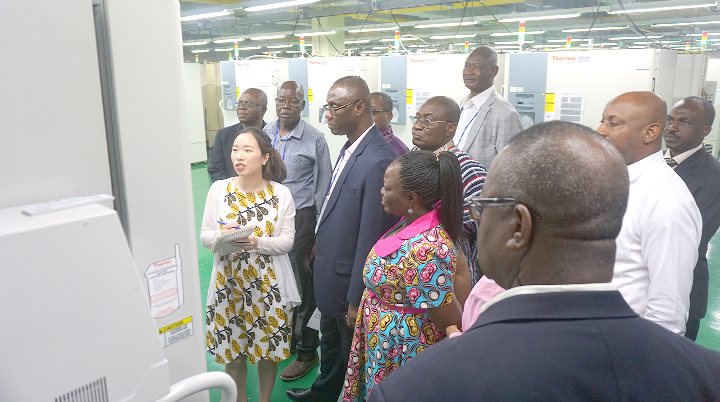
Korea’s development experience: From a beggar nation to a donor country
If any Ghanaian had been given an opportunity to live and work in South Korea in the 1950s, perhaps he or she would have refused the offer. South Korea, at that time, was virtually a wasteland.
Advertisement
Three years of a deadly war from 1950 to 1953 had brought Korea to its knees. Poverty, food scarcity, unemployment, illiteracy, diseases, lack of infrastructure, among others, became the lot of Korea. The underdevelopment of Korea was partly exacerbated by an ideological war between the Western and the Eastern blocs at the time.
In sharp contrast to the South Korean situation, Ghana, about that time, especially in the early 1960s, was far better. Ghana’s per capita income between 1960 and 1962 was $190, while that of South Korea was $91. What even worsened South Korea’s predicament was the fact that it had virtually no resources apart from its human capital.
Hard times
To be able to meet its foreign exchange requirement those days, South Korea even resorted to the exportation of labour and, in some extreme cases, the hairs of its women to earn some hard currency. Between 1966 and 1970, for example, Korea had to despatch as many as 400,000 of its soldiers to fight in the Vietnam War. Additionally, a number of mine workers and nurses were sent to work in industrialised countries for South Korea to survive. It also heavily depended on donor support.
Changing the fortunes
From the late 60s to now, South Korea has been able to change its narrative from a beggar nation to a donor country. With the current population of about 50 million, Korea now has more than $20,000 per capita income.
Obviously, the question that boggles the mind is: how was South Korea able to rewrite its development script and take control of its destiny? Unfortunately during the same time, Ghana could not develop at the pace Korea developed although its economy was better than the Far East country.
Even though Ghana has witnessed massive development in some areas, the country is yet to develop in other critical areas, such as rail transport. The robust railway system in the 1960s has now become a pale shadow of itself. Almost 60 years after attaining independence, Ghana is still grappling with sanitation issues such as open defecation, and indiscriminate dumping of waste. This is not to say that Korea does not have challenges.
In July this year, by courtesy of the Korea International Agency for Cooperation (KOICA), a 14-member Ghanaian delegation was in South Korea to learn of that country’s development experience, and how it could be beneficial to Ghana’s development. The one-week training programme dubbed: “High-level partnership programme for economic development (Ghana)” was an eye-opener.
Other Trending Stories
Development views
There are divergent views about what constitutes development. While a school of thought believes that development is measured by factors such as per capita income, gross domestic product, rate of inflation, foreign exchange reserves, infrastructure etc, others subscribe to the notion that development is measured by indices such as health, education and security.
Notwithstanding the way one measures development, Korea is, by all standards, a well-advanced country. Currently it is among the first 15 most developed economies in the world. Talk about road infrastructure, education, industries, information and communications technology, agriculture, cooperatives, security, health, tourism, human resource development, environment, sanitation, and Korea comes across as an international showpiece.
According to Wikipedia, South Korea has the world's eighth highest median household income and ranks high in personal safety, education, job security, ease of doing business, healthcare quality and life expectancy.
What is amazing is that South Korea has been able to achieve its current level of development without ignoring its culture. The Koreans have been able to maintain their values, discipline, food and their way of dressing. They still maintain their family values of unity and respect for one another.
They received support from Western countries while their development models were, to some extent, influenced by the international community, but they held on to their own unique way of doing things. They speak and write the same language which has been a decisive factor in forging their strong national identity.
Giving back to the world
With the massive breakthroughs that they have achieved, the Koreans are making significant contributions to the international community, especially developing countries. In 2009, South Korea reported to the Development Assistance Committee (DAC) of the Organisation for Economic Cooperation and Development (OECD) net Official Development Assistance (ODA) of US$850.7 million, which comprised US$615.81 million in bilateral ODA and US$234.94 million in multilateral ODA.
At an African Union summit in Addis Ababa in May this year, the President of South Korea, Ms Park Geun-hye, expressed the commitment of South Korea to work hand in hand with Africa to find solutions to some of its development challenges.
The secret
The question that still remains unanswered is how the Koreans were able to develop? What is the single most important strategy for Korea’s development which can be emulated in Ghana? Korea used a combination of strategies, including human resource, hard work and leadership.
The President of the Korea Institute for Development Strategy, Professor Seung-Hun Chun, summed up Korea’s key development strategy in a presentation he made at the training programme: “Endowed with no resource, Koreans realised the miracle by their sweat and endeavour under visionary leadership.”
Ghana has its own history, peculiar circumstances and development challenges, but it can learn from Korea.




